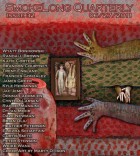What I love about “People Go to Jail For This” is its slow reveal. I want to say it reminds me of peeling an onion but that’s so cliche! And that said, I’ve read hundreds of stories with similar content to this one, but the way you tell it is fresh and gripping, a perfect example of creating something both humorous and tragic. My first question is how did this story come about?
All my stories and poems come about in the same way: I write something I believe to be true about the world in the best and most accurate language I can imagine, then I write something else in the exact same way. I keep doing this. The results are terrible. My drafts are ridiculously bad. The language is purple and all the characters are named Stickpin and everyone has tattoos on their genitals. When I start to re-write I feel deeply ashamed to have written so terribly. Eventually, it gets better. Eventually, I have something I feel good enough about to send out.
As for the material that makes up “People Go to Jail For This,” it’s equal parts autobiography, imagination, and eavesdropping.
I have a CDL license and years ago I applied for a job where you drive organ transplants from hospital to hospital. I didn’t get the gig but, reading up for the interview, I learned a little about the process. The story was originally about that, but the heart thing eventually became a minor detail. As a teenager, I was a good thief, and I’m still fascinated by people who steal. Then there are people with DUIs. People with DUIs are the best. They’re funny and honest, sometimes in jail, sometimes wearing an electronic ankle bracelet around the house. Finally, I love to hear divorced people talk about their ex-husbands and ex-wives; that’s a special kind of hate.
One of the things I think works in this piece is the voice. The narrator is sympathetic, we like him, but he’s in denial. How do you approach voice in your writing? Is this something that just happens or do you go back to create or enhance the voice once you know who the character is?
I like the idea of being open and accessible and easy to read. I definitely stand with Vonnegut who said, “Pity the reader.” Other than that, it’s what the characters want to say and how they want to say it. Hopefully, they want to say it fast because I can get overwhelmed by big books and stories with a lot of fucking words.
You have a lot of work out there in the world. How long have you been writing and what drew you to words on paper?
Even though I’d been writing terrible poems since I was a teenager, I didn’t start reading until I was twenty-one. Reading, because I’d never read or even been around readers, was a revelation. Nothing in my life — save marriage and kids — has changed me in the same way.
The first book of poems I read on my own was There Are Men Too Gentle To Live Among Wolves by James Kavanaugh, and it was as bad as it sounds.
The next book I read was What Work Is by Phil Levine and it was great.
So I guess I’ve been reading and writing seriously and publishing for almost twenty years. My first poems appeared in The Wormwood Review which was a great little magazine published by Marvin Malone. I was twenty-two and just kept writing and trying to publish, sometimes with success, often without.
I don’t always like to write but I love to read and reading inspires me to write and not writing feels hypocritical. There are enough writers out there not writing. Check in with any writing program and / or their recent graduates.
Who are your heroes, writing and otherwise, and why?
My heroes change all the time, but I’m always interested in writers who exist on the margins, writers who don’t get grants and tenure-track teaching positions but still manage to hang onto the dream of putting words out there in the world. I love people who write about work. When I first started reading, I fell in love with the poems of Joan Jobe Smith, especially Jehovah’s Jukebox, an extended narrative about being a go-go dancer in LA during the Sixties and Seventies. It was (and is) an ass-kicking book.
Lately, I’ve been on an Eric Miles Williamson jag. I missed his books when they were first published and now I’m catching up. He writes beautiful sentences about construction workers.
Here’s a quick list of poems by twenty poets I admired when I first started reading which are also still the poems I return to. Some are popular. Some are not. All are worth checking out.
POETRY
Gerald Locklin (“Requiem for Three Bar Guys” and “Captain Midnight Cowboy Sister Carrie”)
Mary Oliver (“Wild Geese” and “The Summer Day”)
Ed Field (“Bio” and “Donkeys”)
Li Po (“Drinking in Moonlight” and “For Tu Fu”)
Bruce Weigel (“Short” and “The Years without Understanding”)
Larry Levis (“The Poet at Seventeen”)
James Laughlin (“Experience of Blood”)
Belle Waring (“The Tip” and “It Was My First Nursing Job”)
Ray Carver (“Drinking While Driving” and “The Baker”)
Pablo Neruda (“Ode to a Pair of Socks”)
Nazim Hikmet (“It’s This Way”)
Etheridge Knight (“Feeling Fucked Up”)
Yehuda Amichai (“God Has Pity on Kindergarten Children”)
Sharon Olds (“Satan Says”)
Carl Sandburg (“Chicago”)
Charles Bukowski (“Fire Station”)
James Wright (“Autumn Begins in Martins Ferry, Ohio”)
Nicanor Parra (“Holocaust”)
William Wantling (“Poetry”)
Richard Brautigan (“The Chinese Checkers Players” and “I’ve Never Had It Done So Gently Before”)
Mike Webster is another hero. He played center for the Pittsburgh Steelers and lead them to four Super Bowls. All the hits eventually destroyed his brain, and he ended up broke and confused and living in his car, but his work ethic and his dedication to his position was unsurpassed. He finished his career with the Kansas City Chiefs, and I think he was the last player-coach in the NFL. When I sit down to write, I think about Mike Webster. I think about what he was able to provide for his family and his city, and the toll that took on his own life.
What is the one thing you do that keeps you in the game, keeps you at the keyboard day after day?
I hate myself when I’m not being creative.



 The core workshop of SmokeLong Fitness is all in writing, so you can take part from anywhere at anytime. We are excited about creating a supportive, consistent and structured environment for flash writers to work on their craft in a community. We are thrilled and proud to say that our workshop participants have won, placed, or been listed in every major flash competition. Community works.
The core workshop of SmokeLong Fitness is all in writing, so you can take part from anywhere at anytime. We are excited about creating a supportive, consistent and structured environment for flash writers to work on their craft in a community. We are thrilled and proud to say that our workshop participants have won, placed, or been listed in every major flash competition. Community works.